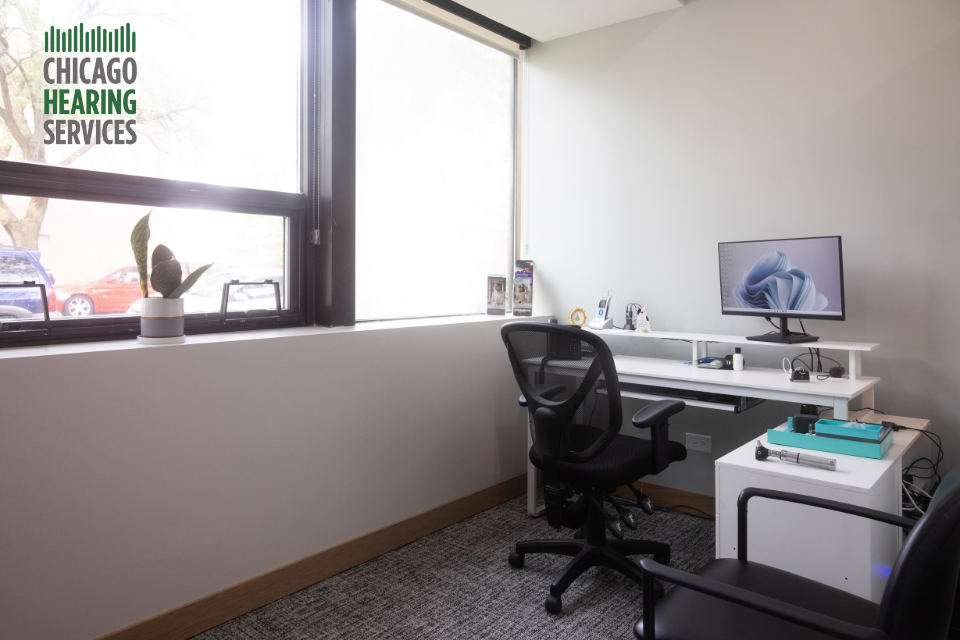Your Guide to Tinnitus:
Causes, Treatment Options, and Support

If you live with ringing, buzzing, or humming sounds that no one else can hear, you know how distracting and frustrating tinnitus can be. For some, it comes and goes. For others, it is constantly interfering with sleep, focus, and everyday life.
At Chicago Hearing Services, we understand how overwhelming this experience can feel. That is why we approach tinnitus care with deep compassion, clinical expertise, and a commitment to helping you find real relief. Whether your symptoms are new or long-standing, we’re here to walk with you every step of the way.
Explore the sections below to learn more about tinnitus and how we can help you manage it.
Tinnitus Causes, Types and Quality
What to Expect During an Evaluation
What is Tinnitus?
Tinnitus is the perception of sound when no external source is present. You may hear ringing, buzzing, hissing, or roaring. The sound may feel like it’s coming from one ear, both ears, or somewhere in your head. It can be steady or fluctuate in intensity.
Tinnitus affects more than 25 million Americans. For some, it is a mild, occasional annoyance. For others, it can significantly impact sleep, concentration, and quality of life.
Tinnitus is often associated with hearing loss but may also stem from other medical conditions or environmental factors. While there is no universal cure, there are effective, science-based tinnitus treatments that can make a meaningful difference in how you feel day to day.
Understanding Tinnitus: Causes, Types and Quality
Causes
The actual causes of tinnitus can vary greatly – it may also be singular or multiple. A complete tinnitus evaluation is the best way to understand the source and severity of your symptoms.
Types
Tinnitus is generally classified into two types:
- Subjective tinnitus is the most common type. Only you can hear the sound.
- Objective tinnitus is rare and may be audible to another listener.
Quality
Tinnitus is a symptom, and much like a headache or pain, it is subjective and varies widely between patients. It may be intermittent, constant or fluctuant, mild or severe, may occur in one or both ears or feel as though it is in the head.
It can be difficult to record and quantify, however, a properly trained audiologist can identify where the tinnitus is most affecting your quality of life and help you determine goals for treatment.
What to expect from a Tinnitus Evaluation?

No two people experience tinnitus the same way, so we never take a one-size-fits-all approach. During a tinnitus evaluation, you will receive:
A Comprehensive Hearing Evaluation.
Expert Research-Based Education: we will explain what you’re experiencing and provide insights based on the latest research.
Review of Your History and Symptoms: A thorough review of your medical history and current symptoms to better understand your individual needs.
Tailored Recommendations: Our experts will provide personalized recommendations specifically suited to your situation.
Can Tinnitus Be Treated?
Yes. Depending on the determined cause of your tinnitus, Dr. Dudley will make a recommendation for the best possible treatment plan.
Very often, we find that those who suffer from tinnitus also have hearing loss, this is why a hearing test is part of the tinnitus evaluation. When the ear stops hearing certain frequencies because of hearing loss, the brain will oftentimes try to compensate by causing you to hear those frequencies when they are not actually present — this in many cases is the ringing that you hear. Treating hearing loss will most commonly improve the symptoms of tinnitus after the mind has had time to acclimate to hearing correctly again.
In some cases, however, tinnitus is not related to hearing loss. When that is the case, Dr. Dudley will walk you through other treatment options, one of which may be Lenire, the only FDA-approved, non-invasive device using bimodal neuromodulation to reduce tinnitus symptoms. Lenire has shown clinical success in helping many individuals find meaningful relief.
Dr. Marie Vetter on Hearing Loss and Tinnitus

In this interview with HealthAdvocateX, Dr. Marie Vetter discusses the challenges of living with tinnitus and hearing loss and the emotional toll these conditions can take. She highlights the importance of early evaluation, personalized care, and what compassionate, patient-focused support truly looks like.
Ready to Take the First Step Toward Relief?
You do not have to live with the constant distraction of tinnitus. At Chicago Hearing Services, our team will listen to your concerns, answer your questions, and support you through every step of the evaluation and treatment process.
Schedule your tinnitus evaluation today and begin a care plan focused on your quality of life.
Frequently Asked Questions About Tinnitus
Is tinnitus a disease?
No. Tinnitus is a symptom, not a disease. It often indicates an underlying issue with the auditory system or other health-related concerns. A thorough evaluation is essential to determine the possible causes and appropriate management.
Is there a cure for tinnitus?
While there is no universal cure for tinnitus, there are effective treatment options available. These include sound therapy, hearing aids, lifestyle changes and newer treatments like Lenire. The right solution depends on the determined cause of your tinnitus after a comprehensive tinnitus evaluation is completed.
When should I see an audiologist about tinnitus?
If tinnitus is persistent, affects your daily life, interferes with sleep or concentration, or is accompanied by hearing loss, it’s important to schedule an evaluation with an audiologist.
Is tinnitus linked to hearing loss?
Tinnitus often occurs alongside hearing loss. In many cases, treating hearing loss with hearing aids can also help reduce the perception of tinnitus.
Can stress make tinnitus worse?
Yes. Emotional stress and anxiety can heighten tinnitus awareness. Management strategies often include relaxation techniques, counseling, and cognitive behavioral therapy (CBT) to reduce the impact of stress on symptoms.
Does everyone with tinnitus hear the same sound?
No. Tinnitus is highly individualized. Some people hear ringing, while others describe it as buzzing, or humming. The sound may be constant or intermittent and can change over time.
What is Cognitive Behavioral Therapy (CBT)?
CBT offers an effective method for managing tinnitus by reframing negative thought patterns and emotions related to tinnitus, thus reducing the emotional burden the condition imposes. Dr. Kristen Davia, who sees patients at our sister clinic location Northwest Speech and Hearing Center, is certified in CBT.
What is Lenire?
Lenire is an FDA-approved device that combines sound and tongue stimulation to retrain the brain’s response to tinnitus. It’s a safe, non-invasive treatment offered under the care of our tinnitus specialist and Doctor of Audiology. Learn more about Lenire here.
How do I schedule a tinnitus evaluation?
You can request an appointment online below or call our office directly at (773) 685-9202. We will work with you to find a time that fits your schedule.

